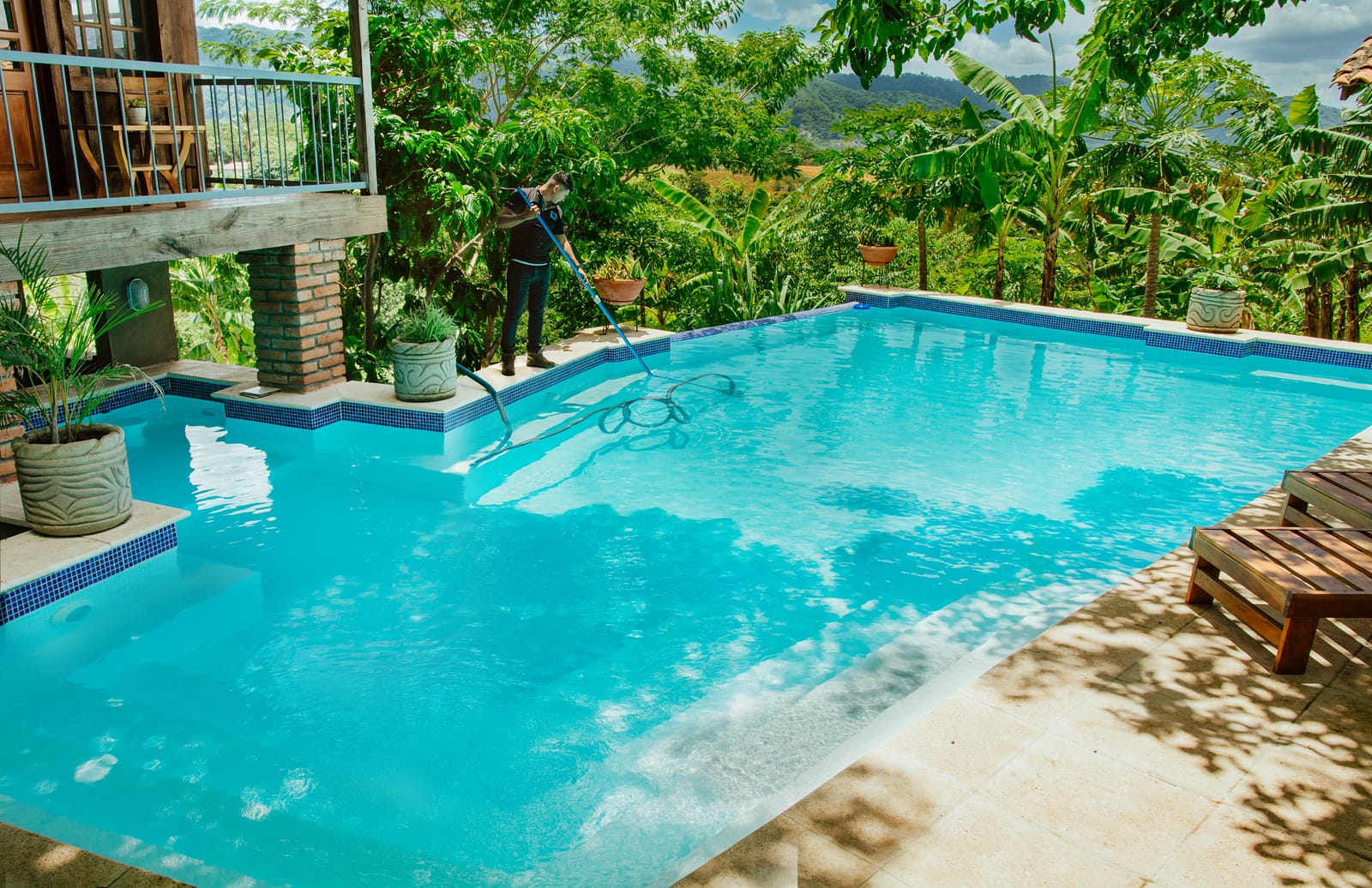Keeping a pool clean is essential for water safety and long-term maintenance. However, many homeowners believe shared pool cleaning myths can lead to improper care, costly repairs, or unsafe swimming conditions. Misinformation about pool maintenance often results in algae growth, unbalanced water chemistry, and damaged equipment.
This article debunks the most common pool cleaning myths, helping homeowners understand the best practices for keeping their pools in top condition.

Myth #1: Pool Water Is Clean as Long as It Looks Clear
The Truth About Clear Water
Many homeowners assume that if pool water looks clear, it is clean and safe for swimming. However, clear water is not free of bacteria, algae, or harmful contaminants. Water can contain microscopic organisms and unbalanced chemicals not visible to the naked eye.
Why Regular Water Testing Matters
Testing pool water regularly is essential to maintain a proper chemical balance. Chlorine, pH, alkalinity, and other factors must be checked to prevent bacteria growth and protect swimmers. Without testing, pool water can become unsafe, even if it appears clean.
Ignoring water balance can lead to the following:
Skin and eye irritation due to improper pH levels. Algae growth, which can quickly spread and cause murky water. Corrosion or scaling on pool surfaces and equipment leads to costly repairs.
Myth #2: Chlorine Is Harmful to Swimmers
Understanding Safe Chlorine Levels
Many homeowners believe chlorine is harmful and should be minimized in pool maintenance. However, chlorine is essential for keeping pool water free from bacteria, viruses, and algae. When maintained at proper levels (typically 1-3 ppm), chlorine is safe for swimmers and helps prevent waterborne illnesses.
What Causes Eye and Skin Irritation
Chlorine does not cause red eyes, itchy skin, or a strong chemical smell in pools. These issues arise from chloramines, which form when chlorine reacts with contaminants such as sweat, body oils, and urine. High chloramine levels indicate the pool requires more chlorine or proper shock treatment to break down unwanted compounds.
To prevent irritation:
Maintain proper chlorine levels and test water regularly. Shower before entering the pool to reduce contaminants. Ensure good water circulation and filtration to keep chemicals balanced.
When used correctly, chlorine keeps pool water safe without causing swimmers discomfort.
Myth #3: You Can Skip Pool Cleaning in the Winter
Why Off-Season Pool Maintenance Is Essential
Many homeowners believe pool cleaning is unnecessary when not in use. However, neglecting maintenance during colder months can lead to long-term damage, algae growth, and costly repairs. Even covered pools require attention to prevent imbalanced water chemistry and equipment issues.
Winter Maintenance Tips for Pool Owners
To keep a pool in good condition during the off-season, homeowners should:
Maintain proper chemical levels to prevent algae and bacteria. Keep the pool covered to reduce debris buildup. Run the pool pump periodically to avoid freezing and equipment damage.
Skipping winter maintenance can lead to green water, damaged surfaces, and expensive repairs when the pool is reopened in warmer months.
Myth #4: Pool Chemicals Are the Only Way to Keep Water Clean
The Importance of Filtration and Circulation
Many homeowners believe adding chemicals is the only step to maintaining a clean pool. While chemicals are crucial, filtration and circulation are just as important. Pool filters remove debris, dirt, and contaminants, while water circulation prevents stagnation and algae growth.
A well-maintained filtration system helps:
Reduce the need for excessive chemical use. Prevent cloudy water caused by debris buildup. Distribute chemicals evenly throughout the pool.
The Right Balance Between Chemicals and Mechanical Cleaning
Skimming, brushing, and vacuuming the pool are essential steps in maintenance. Leaves, dirt, and algae can accumulate on pool walls and the water surface, making filtration less effective. Combining regular cleaning with proper chemical treatment ensures balanced, crystal-clear water.
Myth #5: Shock Treatments Can Replace Routine Maintenance
What Shocking Does
Shocking a pool helps break down organic contaminants like sweat, sunscreen, and bacteria. However, it does not replace routine pool care. Many homeowners mistakenly believe that occasional shock treatments eliminate the need for regular chemical balancing and cleaning.
Why Consistent Cleaning Still Matters
Even with shock treatments, pools require ongoing maintenance, including:
Regular chlorine level checks to ensure proper disinfection. Brushing and vacuuming to prevent algae growth. Skimming to remove debris before it sinks and decomposes.
Shocking is an important part of pool care, but it should supplement—not replace—routine maintenance.
Myth #6: Baking Soda Is a Substitute for Pool Chemicals
What Baking Soda Does in Pool Water
Some homeowners use baking soda as a substitute for commercial pool chemicals, believing it can replace pH balancers and alkalinity products. While baking soda can raise total alkalinity, it does not adjust pH levels significantly or disinfect pool water.
The Risks of Using Household Products in Pools
Using household products instead of professional pool treatments can lead to:
Improper chemical balance, which affects water quality. Increased risk of algae growth and bacteria due to inadequate sanitation. Damage to pool equipment if chemicals are not correctly balanced.
Pool-specific chemicals are formulated for safe and effective water treatment. Using the right products helps maintain a healthy and balanced swimming environment.
Myth #7: Pool Cleaning Is a DIY Task for Every Homeowner
The Challenges of DIY Pool Maintenance
While some homeowners manage basic pool care, maintaining water balance, filter efficiency, and equipment health can be complex. DIY pool maintenance can lead to chemical imbalances, algae growth, and expensive repairs without proper knowledge.
When to Call a Professional Pool Cleaner
Signs that professional pool cleaning may be needed include:
Persistent algae or cloudy water despite regular cleaning. Difficulty maintaining proper chemical balance. Equipment issues, such as poor filtration or water circulation problems.
The Benefits of Professional Pool Services
Hiring a professional pool cleaner ensures:
Proper chemical treatment and water balance. Thorough cleaning to prevent algae and bacteria buildup. Regular inspections to catch minor issues before they become costly problems.
Ready for Hassle-Free Pool Maintenance?
Keeping a pool clean and safe requires consistent maintenance, proper chemical use, and regular inspections. 411 Pool Cleaners provides expert pool cleaning services to help homeowners maintain a pristine swimming environment without the hassle.
Find expert pool maintenance services by browsing the directory for a trusted pool cleaner near you.
